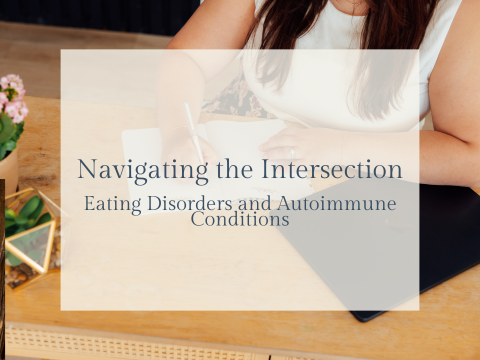Angela Prior
lcsw, ryt, ciec
hey there!
The AP blog is here for all things mental health, embodiment, yoga, and burnout. Poke around and take what you need.
meet angela
Navigating the Intersection: Eating Disorders and Autoimmune Conditions
September 17, 2025
When I decided to develop a specialization as an eating disorder therapist I anticipated that many of my clients would have had traumatic experiences, dealing with anxiety, depression, and maybe OCD. What I did not anticipate was the co-occurring medical conditions that fall under the autoimmune bucket or hormone related conditions such as PCOS, lupus, fibromyalgia, and endometriosis. It quickly became apparent that If I was going to work with individuals who have disordered eating I was also going to be working with individuals navigating intersection of mental health and autoimmune conditions.
Autoimmunity and Eating Disorders: A Complex Intersection
The relationship between autoimmune and eating disorders is not a direct line but rather complex and multi-faceted, with each potentially influencing the other. In one study it found that at the start of eating disorder treatment, participants had a higher lifetime prevalence of autoimmune conditions compared to a control group (8.9% vs. 5.4%). Another study that was completed nationwide in Denmark found that children and adolescents with autoimmune or autoinflammatory diseases had a 36% higher hazard for anorexia nervosa, a 73% higher hazard for bulimia nervosa, and a 72% higher hazard for an eating disorder not otherwise specified.
Lack of Research
Now with all things eating disorders related it’s important to call out how notoriously underfunded eating disorders are. For example, a 2015 report showed that the National Institute of Mental Health (NIMH) funding for eating disorder research was the most disproportionate to its burden of illness compared to all other psychiatric conditions. The funding amounted to about $0.73 per affected person in the U.S., when compared to the funding for other conditions like autism ($58.65 per person) and schizophrenia ($86.97 per person). This disparity limits the overall research, including studies on comorbidities. It’s also important to note that eating disorders have the 2nd highest mortality rate of a mental health condition.
Autoimmune and Eating Disorder research typically exist in separate scientific and clinical silos. Funding bodies often specialize in one area for instance like the National Institute of Allergy and Infectious Diseases (NIAID) for autoimmune research or the National Institute of Mental Health (NIMH) for eating disorders. They don’t have dedicated funding opportunities for research that crosses over. This makes it difficult for researchers to get grants for studies on the bidirectional relationship between these conditions.
Knowing that we have limited research between the two this blog post does navigate some shared risk factors and how they may impact the co-occurrence of eating disorders and autoimmune.

Shared Genetic and Environmental Factors
Both autoimmune diseases and eating disorders have a strong genetic component. Research has identified several genes that predispose individuals to both conditions. For example, certain genes related to the immune system’s function and inflammatory response are also linked to an increased risk of developing an eating disorder.
Environmental factors, such as stress, trauma, and early-life adversity, are also shared risk factors. Chronic stress can trigger and exacerbate both autoimmune flare-ups and disordered eating behaviors. In some cases, the onset of an eating disorder may be a response to the stress and uncertainty of living with a chronic illness.
Treatments as a risk factor
Many autoimmune disorders have recommendations of managing their symptoms with changes in diet. Particularly with recommending anti-inflammatory diets or placing a large emphasis and focus on what someone is eating and relating to how it makes them feel. Anytime we are limiting food groups, using prescriptive language around what someone should or should not be eating, and having to place a large emphasis on food in general these are all risk factors for developing disordered eating. Not to mention if you already have an eating disorder these types of behaviors would be working counter intuitively to recovery work and place someone at a higher risk of relapse.
Body Image
The psychological and behavioral aspects of these two conditions also overlap significantly. Individuals with autoimmune conditions may experience body image concerns due to physical changes, such as weight fluctuations, bloating, skin rashes, or joint swelling. These changes can trigger or worsen body dissatisfaction and lead to disordered eating.
When you feel uncomfortable or are experiencing pain in your body it can quickly become distorted and translated to something is wrong about my body. Which can impact a person’s body satisfaction and in our current society’s value on thinness and wellness it can seem that the solution is to change the shape of one’s body.
Feeling out of Control
Auto immune conditions can make a person feel out of control and powerless. Their condition can be unpredictable, stigmatized, and have a lack of understanding around them. There often can be a delay in getting a diagnosis, medical gaslighting, and medical trauma that a person may experience. These experiences and feelings can encourage a person to want to find some power, agency, and control. Maladaptively this can look like finding control through food intake.
Navigating Treatment
As a clinical social worker, I’ve found myself needing to be able to extend my role of therapist to help navigate this complex intersection of mental health and physical health. Because I often meet with clients weekly, I’m in a unique position to see the full picture; not just the emotional and psychological struggles, but also the subtle shifts in physical well-being.
This has required me to get more specialized training to understand the medical conditions that frequently co-occur with eating disorders. My job isn’t to diagnose these conditions, but to be able to flag things when they come up. I screen for signs and symptoms that could indicate an underlying medical issue, which then allows me to better guide my clients to follow up with additional medical professionals and medical resources.
My goal is to empower my clients to become their own best advocates. The medical system can be confusing and intimidating, and my role is to help them navigate it with confidence. I can explain what certain medical results might mean, help them prepare for appointments, and even serve as an advocate by communicating directly with their medical team.
This insight into understanding the medical and physical health of my clients is crucial because a client’s medical journey and physical health can and often do directly impact their emotions, coping, mental health, and eating disorder recovery.

eight free meditations
To Support Your Mental Health
Let's Work Together
Meet Our Team of Therapists + Yoga Instructors